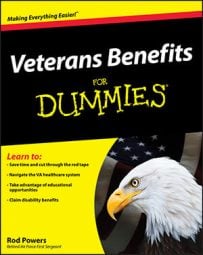A VA pension is a benefit paid to wartime veterans, 65 or older, with limited or no income. Pensions are also paid to veterans under 65, who are permanently and totally disabled.
VA disability compensation is payable to veterans who have service-connected disabilities that have been rated by the VA to be at least 10 percent disabling. You can’t receive VA disability compensation for disabilities that aren’t service-connected.
VA pensions, on the other hand, are payable to many veterans who have at least one day of wartime service, even if they don’t have a service-connected disability.
Generally, you may be eligible for the VA pension if you meet all the following criteria:
You were discharged from service under conditions other than dishonorable.
You served at least 90 days of active military service, one day of which was during a wartime period. If you entered active duty after September 7, 1980, generally you must have served at least 24 months or — if you’re a member of the Reserves or National Guard — the full period for which called or ordered to active duty.
Your countable family income is below a yearly limit set by law (the yearly limit on income is set by Congress).
You are age 65 or older, or you are permanently and totally disabled, not due to your own willful misconduct. The disability doesn’t have to be service connected.
To receive a VA pension, you must have an annual household income below the limits shown here.
| If You Are a . . . | Your Yearly Income Must Be Less Than . . . |
|---|---|
| Veteran with no dependents | $12,250 |
| Veteran with a spouse or a child | $16,051 |
| Housebound veteran with no dependents | $14,978 |
| Housebound veteran with one dependent | $18,773 |
| Veteran who needs aid and attendance and has no dependents | $20,447 |
| Veteran who needs aid and attendance and has one dependent | $24,239 |
| Two vets married to each other | $16,051 |
For each additional child, add $2,093 to the limits shown here. For early war veteran (Mexican border period or WWI), add $2,783.
Congress usually changes these limits on December 1 of each year to account for inflation. For the current limits, see the VA's pension page.
Veterans pensions and income exclusions
Your countable income includes income received by you or your dependents, if any, from most sources. It includes earnings, disability and retirement payments, interest and dividends, and net income from farming or business.
There is a presumption that all of your child’s income is available to or for you. However, you can exclude a portion of your child’s income. For 2012, the annual exclusion limit is $9,750.
Some income is not counted toward the yearly limit. For example, welfare benefits, food stamps, and Supplemental Security Income (SSI) aren’t counted. Additionally, you’re allowed to deduct certain medical and educational expenses. When you apply for a VA pension, you should include all income and deductions. The VA will exclude any income and include all deductions allowed by law when computing your annual family income.
Receiving a veterans pension
Assuming you qualify, your annual pension is the difference between your countable family income (after exclusions and deductions) and the income limits shown earlier. This amount is then divided by 12 and rounded down to the nearest dollar. This gives you the amount of your monthly pension payment. VA pensions are exempt from income taxes.
You can’t receive a VA non-service-connected pension and service-connected disability compensation at the same time. However, if you apply for the pension and are awarded payments, the VA will pay you whichever benefit is the greater amount.
Lifelong pensions for Medal of Honor veterans
Veterans who have earned our nation’s highest military decoration, the Medal of Honor, receive a lifelong pension, beginning when they retire or separate from the military. This pension is paid in addition to any other monetary benefits they may be entitled to, such as military retirement or VA disability compensation.
The pension rate for 2012 is $1,237 per month. The Medal of Honor pension is not subject to income taxes.
Congress generally changes this rate on December 1 of each year to account for inflation. For the current rates, see the VA's pension page.

